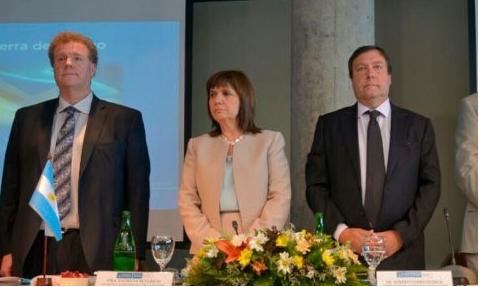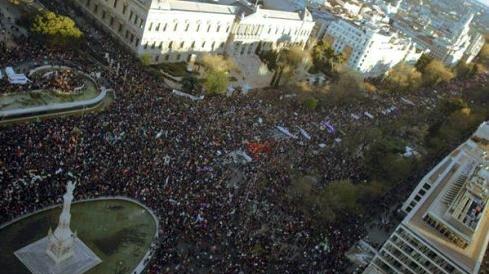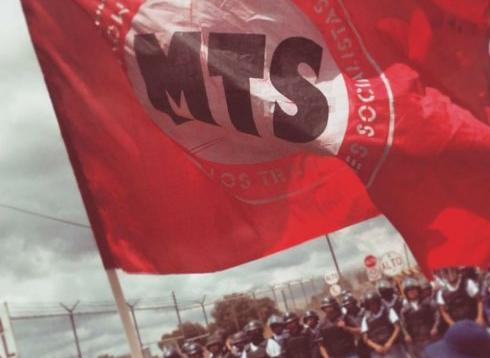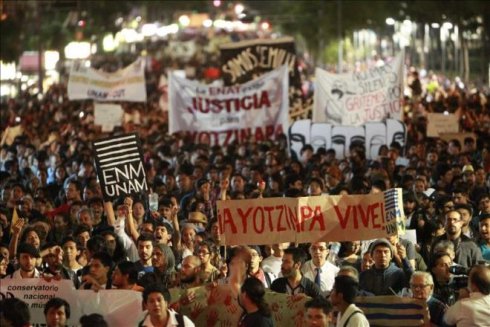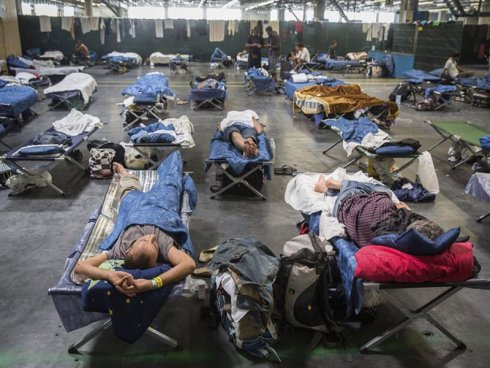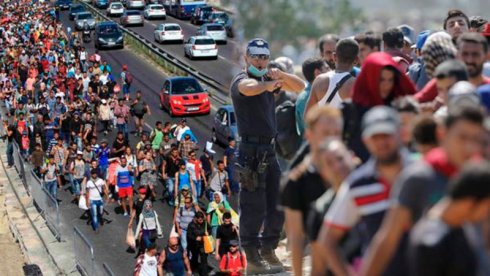Military police, out of the University of Sao Paulo!
“They arrested 73.... Now there are thousands of us fighting at the same time"
19/11/2011
By LER-QI, Brazil
The transformation of the Butanta campus into a battlefield, on Tuesday, November 8, with 73 political prisoners, prosecuted for struggling, recalling the darkest days of the military dictatorship, is a complete demonstration of the fact that the entry of the Military Police into the University of Sao Paulo (USP), contrary to guaranteeing "safety," serves to impose terror on all those who dispute the elitist and racist plan for a university implemented by Rodas. Besides the student prisoners, a director of the Sintusp union and three members of the CBD (rank and file delegates group), who were in the Rector’s Office in support of the students’ struggle, were also arrested.
The Rector’s Office and the state government threatened to charge the movement activists with civil disobedience, plundering the public legacy, environmental crime and even forming a gang! The daily espionage that the Rector’s Office carries out against the students of the CRUSP (students’ dormitories) and activists of the students’ and workers’ movement is the same sort of thing. The police, who entered the Rector’s Office, destroyed everything they found in the way, in order then to charge the students with throwing Molotov cocktails, to justify such a big military apparatus and facilitate criminalizing the movement.
Rodas, who was a lawyer defending the state during the trial that held the dictatorship responsible for the murder of Zuzu Angel, tried to make a monument in the USP in tribute to the "Revolution of 1964" (the military coup), and now shows his real face, by bringing the dictatorship inside the University.
The assembly of 3,000 students, that declared the general student strike Tuesday night, endorsing the struggle to demolish the agreement with the Military Police, and for an end to the trials against students and workers, adding to the guidelines the cancellation of the trials against the political prisoners, was an enormous demonstration that the decision to fight by around 500 students that occupied the premises of the University to build a mass struggle for Military Police, Out! was extremely correct.
Let us build a national campaign to cancel the background checks against the USP political prisoners
The struggle to cancel the trials against the 73 USP political prisoners must become not only a symbol of the struggle against political persecutions of students and workers that resisted the attacks that seek to privatize and gentrify the university still more in recent years, but also against the government persecutions of all the activists and fighters of the Landless Movement and of the workers’ and popular movement in the country. If we manage to overturn the persecutions against the 73, we will be much stronger for revoking the trials against the 13 political prisoners from the demonstrations to repudiate Obama’s arrival in Rio de Janeiro at the beginning of the year. The workers at the USP will feel much stronger for taking up again, together with the students, the struggle for the reinstatement of Claudionor Brandao, Director of the Sintusp union, dismissed for political reasons. We will be in a much better condition to revoke the dozens of trials against USP students and workers. It will be an example for fighters throughout the country, that it is possible to defeat government repression. They shall not pass!
To set up this campaign, we call on all intellectuals, unions, human rights organizations, student organizations, social movements and leftist political organizations to build a big national campaign to cancel the trials against the 73 USP political prisoners. We propose the creation of a fund for struggle, to pay for posters, pamphlets, press announcements, etc.
Long live the command with delegates elected from the rank and file
Unlike the processes of previous struggles, the assembly that decided on the strike approved the formation of a command with delegates elected in the school year [freshman, sophomore, etc.] assemblies, with one delegate for every twenty students present in the assemblies. This was an enormous victory. A command like that will guarantee that the resolutions adopted in assemblies will be carried out in a democratic and unified manner, by the groups most dedicated to the struggle, based on the school years, contributing not only to opening up the movement to everyone, but also to unified action to strike with a single fist at the Rector’s Office and the state government. In the first meeting of the command, Wednesday night, about 70 people represented more than 1,400 students gathered in the school year assemblies. Every delegate that fails to fulfill his mandate, for which he was elected, will have to be recalled, so that the representatives of the movement will be those most prepared to lead the movement to victory.
The struggle for Military Police Out must dispute the elitist character of the University!
The communications media are trying to isolate our movement from the whole of society by saying that we are privileged, because we study at USP, and that our struggle for the expulsion of the Military Police from the University has an elitist character, because we want the USP to be an "island," still more isolated from the whole of society. Now that we are thousands, gathered in the general assemblies and in the school year assemblies, we must explain very strongly that the university autonomy we defend is a political autonomy, coming from the right to question the social function performed by the police, of systematic repression of the poor and black population in the favelas, as a structural mechanism to control the social tensions provoked by the monstrous social inequality of the country and by chronic poverty, that affects most of the population, living on precarious employment, threatened by massive joblessness, dying in the lines in the hospitals, losing their homes and relatives with the inundations, subjected to schools that are prisons, people who, in any attempt to protest, are massacred by brutal police repression. We defend university autonomy, not as a privilege, but as a barricade in the class struggle, that was important in a large part of the big processes of struggle in the twentieth century, like the 1968 strike wave.
We must make it clear that, contrary to our being satisfied with being a privileged minority, we defend the idea that the children from the working class and the impoverished population should enter the University. We have communicated this idea to the population through a strike manifesto, through the call for public classes with intellectuals who are supporting us, and through all the creative media that we can think of. If we succeed in breaking the reactionary press blockade and in passing on this message, we will become a reference point of struggle for the thousands of young people and workers who are enthusiastically following our struggle. Geraldo Alckmin, the State Governor, says that the USP students in struggle need to have "classes in democracy." How "democratic" this government is, responsible for bringing a dictatorship inside the USP, with spying, persecution, militarization, and political prisoners! The real "class in democracy" that we need to have, is to knock down this oligarchic power structure, that is getting stronger in the University, and to set up a Free and Sovereign Enacting Assembly, that will fight for an administration shared by students, workers and Professors, with a student majority.
The PSOL and the PSTU must review their politics and contribute to the victory of the movement
Despite the fact that the PSOL and the PSTU are trying to reposition themselves and appear as part of the movement, they insist on a strategy that can only lead to defeat. They refuse to accept the reality — now difficult to counter — that the decision to fight by the approximately 500 students who occupied the premises of the administration of the Department of Philosophy and, subsequently, the Rector’s Office, played a key role in the building of a movement for Military Police Out! that now includes thousands, in several USP school years. The decision to join this movement necessarily entails confronting the shared sense of a large number of students, who accept the dominant ideology that legitimizes the need for the Military Police, as the only way to guarantee "public safety," although limiting their action and preventing possible "excesses." That is the decision that the PSOL and the PSTU do not want to make, since it would threaten success in the student elections, to take place at the end of the year. For that reason, they were against the immediate strike in the Tuesday night assembly (defending the famous "construction," that never ends, while we have 73 political prisoners and the University transformed into a battlefield). And, after they were defeated, they proposed, as a central theme of the movement, a "public safety plan." One need not be a socialist to believe that urban violence is a problem with a social source, and not a matter of "public safety." It is sufficient to be a consistent republican to believe that urban violence will not be resolved with instruments of repression, but will indeed be settled with a policy that guarantees employment, housing, health care, decent education and culture for everyone. But these same tendencies, that claim to be from the left, appear to forget that and repeat the talk about "public safety and for the security forces to be appointed in the same way and status as public servants” ! The comrades should think deeply about this, since it is a disgrace. Still more so, since it involves comrades who claim to be revolutionaries, like the militants of PSTU. In defending an "alternative security plan," the PSTU and the PSOL, in addition to giving an elitist content to Military Police Out!, of defending the elitist University, the way it is now (an elitist USP, plus security), with a semi-feudal power structure, are paving the way for diverting the movement, for some crumb given by the Rector’s Office.
November 10, 2011
